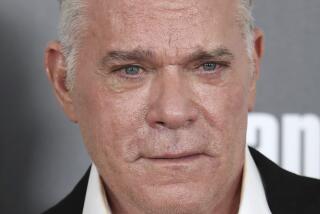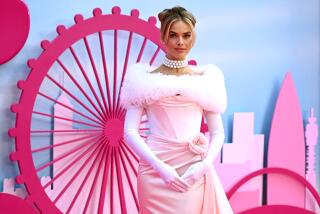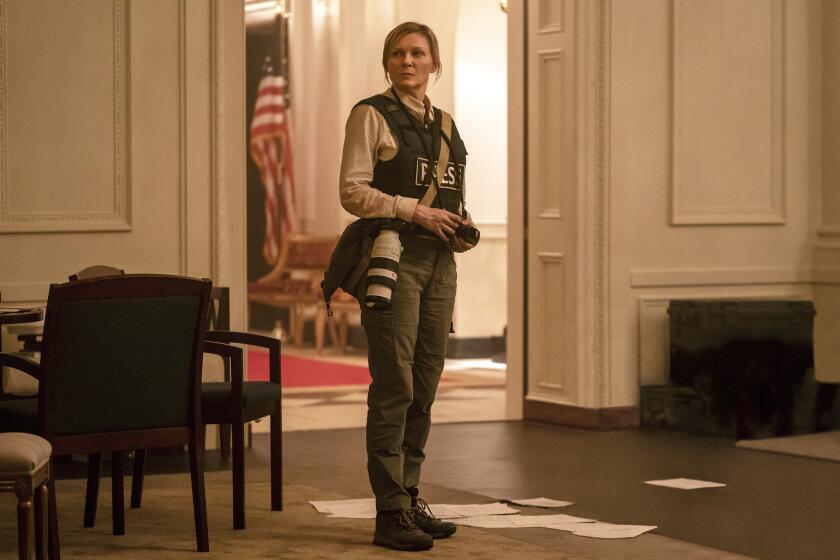Wong Kar Wai makes his American statement
WITH his ever-present sunglasses and cultivated mystique, Hong Kong filmmaker Wong Kar Wai has become one of the most distinct brand names on the international cinema circuit. His latest, “My Blueberry Nights,” which opened Friday in Los Angeles, has all the tell-tale signs of previous films such as “In the Mood for Love” or “2046” -- interconnecting story lines, an eclectic soundtrack, attractive performers and a dreamy, impressionistic style that adds up to a delirious meditation on romantic love and longing.
Though he previously shot outside Asia when he made “Happy Together” in Argentina, “My Blueberry Nights” marks the first time Wong has worked in English and filmed in the United States.
“The real challenge about working on ‘My Blueberry Nights’ was thinking in American,” Wong said from Hong Kong via e-mail. “Just like when I shot in Argentina, I realized that the local mind set was something you could approach, gaze into, but never really possess yourself. My constant reassurance was the thought that film is universal.”
Though the film is full of its own idiosyncrasies, “My Blueberry Nights” places Wong in a long line of foreign auteurs who have come to America to make a film that also winds up being in no small part about America. Though Hollywood has always been a magnet for emigres -- from Wilder to Woo -- this is distinctly different; these are filmmakers coming to America not for the temptation of “going Hollywood” but rather to explore the idea of America as seen through the camera lens, a reflection and refraction of Hollywood storytelling. . These films, if one can generalize, tend to be odd.
Italian director Michelangelo Antonioni followed “Blow-Up,” his look at swinging Sixties London, with a portrait of turn-of-the-Seventies American hippies in “Zabriskie Point.” The French filmmakers Francois Truffaut and Jean-Luc Godard each briefly flirted with directing “Bonnie and Clyde.” Godard later abandoned a project shot in the U.S. in collaboration with documentarians D.A. Pennebaker and Richard Leacock known as “One American Movie.”
Frenchmen Jacques Demy and Jacques Deray each took their own look around Los Angeles in “Model Shop” (1969) and “The Outside Man” (1972), respectively. The German Wim Wenders had one of his greatest successes with 1984’s “Paris, Texas,” and later set up shop in the U.S., while Serbian director Emir Kusturica made the quizzical 1993 film “Arizona Dream” here and has yet to return.
“My Blueberry Nights” follows a character played by singer Norah Jones as she travels across the country, and each section of the film was shot where its story takes place. The film begins in New York, where a heartbroken Elizabeth finds solace in late-night conversations with an equally lovelorn diner owner (Jude Law), who waits and waits for the woman who left him (Chan Marshall). Searching for a fresh start, Elizabeth hits the road, taking waitress jobs along the way. In Memphis, she encounters a dangerous booze-soaked couple (Rachel Weisz and David Strathairn), and in Nevada she comes across a sprightly gambler (Natalie Portman) who may not be up for life on the hustle. As Elizabeth boomerangs her way back to New York she stumbles upon the classically Wong-ian idea that physical proximity sometimes has no connection to emotional kinship.
Lost in America
Like many of the world-class filmmakers drawn here, Wong seems particularly attracted to the specific imagery of the American West. As well, the decidedly mixed reception “My Blueberry Nights” received on its premiere as the opening night film of the 2007 Cannes Film Festival is in line with the reception afforded many previous world-cinema directors who have stepped onto American soil. In his original Life magazine review of the much-panned “Zabriskie Point,” for example, Richard Schickel took note of how, like many others before him, Antonioni (who spoke hardly any English) seemed to have lost himself in America, falling “under the spell of the American vastness, the enormous emptiness of our spaces.” “There’s that great line from Wenders, ‘The Americans have colonized our subconscious,’ which is from ‘Kings of the Road,’ ” noted critic Dave Kehr on what keeps drawing outsiders to make films in the U.S. “Certainly you don’t have to have ever come to the United States to have a very definite and vivid idea of what America is like, though it may be wildly inaccurate. All these people have grown up with an America as presented in our movies and pop music.”
Traces of an American influence have surfaced in Wong’s previous films, perhaps most notably in the repeated use of the song “California Dreamin’ ” in “Chungking Express” (1994). While grappling with how to apply his sensibility to an American setting, Wong said that his reference was more the road movie structure of “Easy Rider” than the moody ruminations of “Zabriskie Point.”
Headier ideas often take a back seat, though, as “film production thankfully has enough practical concerns to keep me from worrying about theoretical ones. However, no matter where we live, we all grow up with fragments of American culture. The joy of this movie was to revisit these fragments and to pay homage to them.”
Not all foreigners who make a movie in America are looking to assume a mailing address in the Hollywood Hills. Even among those who might be thought of as the “one-offs,” they often come for reasons all their own.
Veteran French director Bertrand Tavernier, whose films include “Sunday in the Country” “ ‘Round Midnight” and “L.627,” is finishing “In the Electric Mist,” a literary adaptation shot in Louisiana starring Tommy Lee Jones. “As for me, I was not attracted by America but by [author] James Lee Burke,” Tavernier said via e-mail. “I wanted to adapt a very good novel from a very good writer. My next films will be French, in French, about France.”
In the end it is perhaps no great surprise that “My Blueberry Nights,” for all its star-wattage and trappings of Americana, reads first and foremost as a film by Wong Kar Wai. It might easily be subtitled “An American Scrapbook,” a cinematic mixtape of memories and romantic notions. Wong’s co-writer, crime novelist Lawrence Block, called the collaboration “a strange process, because the whole film was very much [Wong’s] conception, but the idea of what the story was kept continuing to evolve.” Block was continually surprised by the extent to which Wong was “very savvy and conversant” about American culture.
“The USA is actually the best showcase of her culture,” said Wong. “Each city has its own history and reference. The preference of one location to another is a choice about what your influences are: art, music, cinema, literature, from William Eggleston to Tennessee Williams; or from Coca-Cola to iPod. Eventually I had to decide what were the essentials, and the locations that finally ended up in the film probably give you a hint of them.”
More to Read
Only good movies
Get the Indie Focus newsletter, Mark Olsen's weekly guide to the world of cinema.
You may occasionally receive promotional content from the Los Angeles Times.







